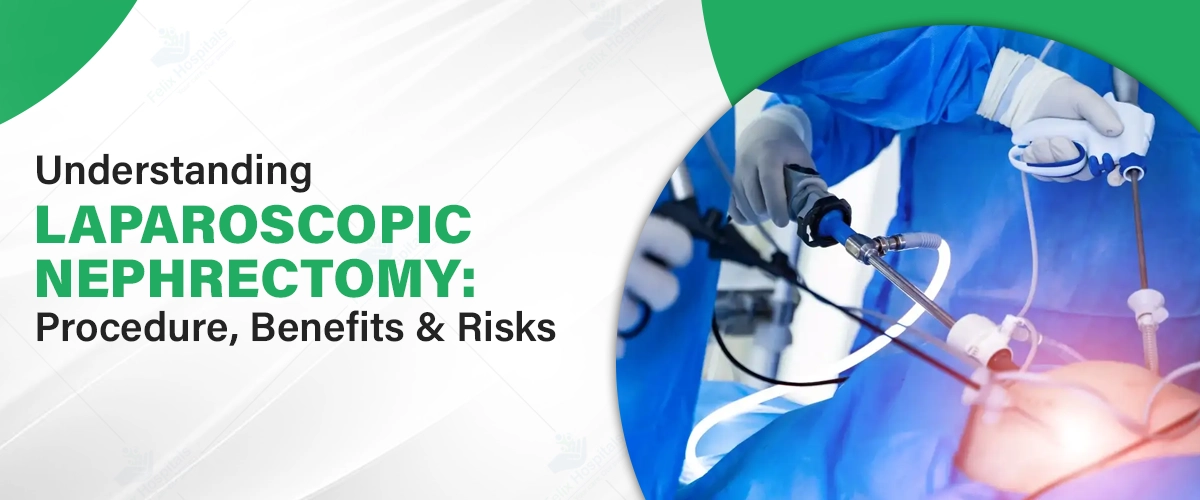
Subscribe to our

Nephrectomy refers to the surgical removal of one or both kidneys, typically performed when there is a serious medical condition affecting the organ. While the idea of having a kidney removed might sound daunting, the advancement in surgical techniques has made this procedure much safer and less invasive.
Laparoscopic nephrectomy, a minimally invasive form of kidney removal surgery, has become increasingly popular. Unlike traditional open surgery, laparoscopic nephrectomy requires only small incisions and uses a laparoscope (a thin, flexible tube with a camera) to guide the surgery. This method significantly reduces recovery times and improves overall patient outcomes. Choosing the best hospital for laparoscopic nephrectomy is crucial to ensure the best results, as the expertise of the medical team and the quality of the facility play a significant role in the success of the procedure.
Have questions or concerns about laparoscopic nephrectomy? We're here to support you through every step of the process. Contact us now at +91 9667064100.
Laparoscopic nephrectomy is a type of surgery where the surgeon removes a kidney using a minimally invasive approach. The key difference between laparoscopic and traditional open nephrectomy is the size and number of incisions. Instead of a large incision, only small cuts are made, through which the surgeon inserts instruments to perform the procedure.
In contrast to open nephrectomy, which requires a large abdominal incision, laparoscopic nephrectomy uses a camera to help the surgeon view the kidney and guide the surgery. This method offers significant advantages, such as reduced pain and quicker recovery.
There are two main types of nephrectomy:
Laparoscopic nephrectomy is generally performed when other treatments, such as medications or lifestyle changes, have not been effective, or if there is a critical medical condition involving the kidney. Some of the common medical conditions that may require nephrectomy include:
Laparoscopic nephrectomy may be preferred over traditional open surgery due to smaller incisions and a quicker recovery process. The decision on whether to use this minimally invasive approach depends on the patient's condition and suitability for the procedure.
The laparoscopic nephrectomy procedure typically follows these steps:
The entire procedure typically lasts between 2 to 4 hours. Compared to open surgery, laparoscopic nephrectomy involves fewer risks and a significantly shorter recovery time.
Laparoscopic nephrectomy offers numerous advantages over traditional open surgery, including:
While laparoscopic nephrectomy is considered a safe procedure, it does carry certain risks, as with any surgery. These include:
Fortunately, these risks are minimized by a skilled surgeon who follows proper protocols and techniques.
After the surgery, patients can generally expect the following:
The success rates for laparoscopic nephrectomy are high, with most patients experiencing positive outcomes. Recovery depends largely on the underlying condition that led to the surgery. For patients with kidney cancer, for example, the prognosis will depend on the stage of cancer and whether the entire tumor was successfully removed.
After nephrectomy, patients typically lead healthy lives with one kidney, as the remaining kidney usually compensates for the lost function.
For those seeking expert care, Dr. Ritesh Kumar Agarwal is a renowned specialist in laparoscopic nephrectomy at Felix Hospitals. With years of experience in performing advanced laparoscopic procedures, Dr. Agarwal is considered one of the best doctors for laparoscopic nephrectomy treatment. Patients can trust his expertise for a safe and successful surgery, ensuring the best possible outcomes. If you’re considering laparoscopic nephrectomy, Dr. Agarwal and his team at Felix Hospitals provide personalized care to guide you through the process.
Schedule a consultation with our expert surgeons today and take the first step toward a healthier future.
Laparoscopic nephrectomy is a safe and effective procedure that offers numerous benefits, including quicker recovery, less pain, and smaller scars. It has become a popular choice for patients requiring kidney removal due to various medical conditions.
It is crucial to consult with a skilled urologist or surgeon to determine if laparoscopic nephrectomy is the right option for you. If you're concerned about the laparoscopic nephrectomy treatment cost, be sure to discuss pricing options with your healthcare provider to better understand the financial aspects of the procedure. Remember, seeking expert medical consultation for kidney-related concerns can help you make informed decisions and ensure optimal health outcomes.
Q- How long will I be in the hospital after laparoscopic nephrectomy?
Ans- Most patients stay in the hospital for about 2-3 days after the surgery, but this can vary depending on individual recovery.
Q- Can a person live with one kidney after nephrectomy?
Ans- Yes, the remaining kidney typically compensates for the loss, and many people lead healthy lives with one kidney. The other kidney can increase its filtration capacity.
Q- What lifestyle changes should I make post-surgery?
Ans- Staying hydrated, following a balanced diet, and avoiding strenuous activities are essential to promote healing and kidney function. Regular follow-ups with your doctor are also recommended.
Q- Is laparoscopic nephrectomy more painful than open surgery?
Ans- No, laparoscopic nephrectomy is generally less painful than open surgery due to smaller incisions and less tissue damage.
Q- What are the chances of complications after laparoscopic nephrectomy?
Ans- While complications are rare, possible risks include infection, bleeding, or injury to surrounding organs. However, the overall risk is lower compared to traditional open surgery.
Q- How soon can I return to work after laparoscopic nephrectomy?
Ans- Most patients can return to work within 2-3 weeks after laparoscopic nephrectomy, depending on their recovery and type of work. Those with physically demanding jobs may need a bit more time to heal.
Q- Will I need dialysis after laparoscopic nephrectomy?
Ans- Dialysis is generally not required after nephrectomy unless both kidneys are removed or the remaining kidney is not functioning properly. Most people can live normally with one healthy kidney.